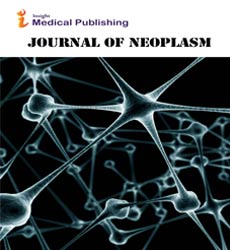Immuno-Oncology: Harnessing the Immune System against Neoplasms
Nebojsa Munir
Department of Neuroradiology, University of California San Francisco, San Francisco, USA
Published Date: 2025-02-28<p>Nebojsa Munir*</p>
<p>Department of Neuroradiology, University of California San Francisco, San Francisco, USA</p>
<p>Corresponding author:
Nebojsa Munir,
Department of Neuroradiology, University of California San Francisco, San Francisco, USA,
E-mail: nebojsa@munir.edu</p>
<p>Received date: February 01, 2025, Manuscript No. IPJN-25-20587; Editor assigned date: February 03, 2025, PreQC No. IPJN-25-20587 (PQ); Reviewed date: February 17, 2025, QC No. IPJN-25-20587; Revised date: February 22, 2025, Manuscript No. IPJN-25-20587 (R); Published date: February 28, 2025, DOI: 10.36648/2576-3903.10.1.004
<p>Citation: Munir N (2025) Immuno-Oncology: Harnessing the Immune System against Neoplasms. J Neoplasm Vol.10 No.1: 004.</p>
Introduction
Immuno-oncology has emerged as one of the most promising fields in modern cancer research, focusing on harnessing the bodyâ??s immune system to recognize and eliminate neoplastic cells. Unlike conventional therapies that directly target tumors, immuno-oncology strategies aim to stimulate or restore the immune systemâ??s natural ability to fight cancer, thereby offering durable responses and long-term remission. This approach has revolutionized cancer treatment by shifting the paradigm from non-specific cytotoxic interventions to targeted immune modulation.Description
The foundation of immuno-oncology lies in the recognition that cancer cells often evade immune detection by exploiting immune checkpoints, altering antigen presentation, or creating an immunosuppressive microenvironment. Therapies such as immune checkpoint inhibitors block inhibitory molecules like PD-1/PD-L1 and CTLA-4, thereby reactivating T-cells to attack tumor cells. This has shown remarkable clinical success in cancers such as melanoma, lung cancer, and renal cell carcinoma, establishing immune checkpoint blockade as a cornerstone of immuno-oncology [1-3]. In addition to checkpoint inhibition, adoptive cell therapies have demonstrated significant progress. Chimeric antigen receptor T-cell (CAR-T) therapy, for instance, involves engineering a patientâ??s T-cells to specifically target tumor-associated antigens. This personalized approach has yielded extraordinary outcomes in hematological malignancies, although challenges remain in extending its efficacy to solid tumors due to antigen heterogeneity and the immunosuppressive tumor microenvironment. Moreover, cancer vaccines and oncolytic viruses are being developed to prime the immune system against tumor-specific antigens, enhancing immune surveillance and memory responses. The integration of immuno-oncology into clinical practice also emphasizes combination therapies, where immune-based treatments are used alongside chemotherapy, radiotherapy, or targeted therapies [4,5].Conclusion
In summary, immuno-oncology represents a transformative approach in cancer treatment by leveraging the immune systemâ??s inherent capabilities to combat neoplasms. With advances in checkpoint inhibitors, adoptive cell therapy, cancer vaccines, and combination strategies, this field continues to offer hope for long-lasting remission and improved survival. As research progresses, overcoming existing limitations will be essential to fully realize the potential of immuno-oncology and establish it as a central pillar of personalized cancer therapy.References
- O’Connell JB, Maggard MA, Liu JH, Etzioni DA, Livingston EH, et al. (2003) Rates of colon and rectal cancers are increasing in young adults. Am Surg 69: 866-872
Google Scholar Cross Ref Indexed at
- Milanzi E, Pelly RM, Hayes IP, Gibbs P, Faragher I, et al. (2024) Accuracy of baseline magnetic resonance imaging for staging rectal cancer patients proceeding directly to surgery. J Surg Oncol 130: 1674-1682
Google Scholar Cross Ref Indexed at
- Choo YJ, Kim JK, Kim JH, Chang MC, Park D (2021) Machine learning analysis to predict the need for ankle foot orthosis in patients with stroke. Sci Rep 11: 8499
Google Scholar Cross Ref Indexed at
- Kim JK, Choo YJ, Chang MC (2021) Prediction of motor function in stroke patients using machine learning algorithm: Development of practical models. J Stroke Cerebrovasc Dis 30: 105856
Google Scholar Cross Ref Indexed at
- Sarker IH (2021) Deep learning: A comprehensive overview on techniques, taxonomy, applications and research directions. SN Comput Sci 2: 420
Google Scholar Cross Ref Indexed at

Open Access Journals
- Aquaculture & Veterinary Science
- Chemistry & Chemical Sciences
- Clinical Sciences
- Engineering
- General Science
- Genetics & Molecular Biology
- Health Care & Nursing
- Immunology & Microbiology
- Materials Science
- Mathematics & Physics
- Medical Sciences
- Neurology & Psychiatry
- Oncology & Cancer Science
- Pharmaceutical Sciences
